Introduction
Operational due diligence stands as a cornerstone for evaluating a company's operational strengths, identifying risks, and uncovering growth opportunities. This rigorous assessment extends beyond financial audits, scrutinizing the effectiveness of operations, management competency, and internal controls. By focusing on areas such as process efficiency, financial controls, compliance, risk management, and technology infrastructure, businesses can mitigate risks while seizing strategic opportunities.
Implementing best practices, such as engaging cross-functional teams, utilizing standardized checklists, and conducting site visits, ensures a thorough evaluation. Leveraging advanced tools and software further enhances the due diligence process, providing critical insights that inform strategic decision-making. Through structured frameworks and actionable value-creation plans, companies can drive significant growth and maintain competitive advantage.
The commitment to ongoing monitoring and continuous improvement solidifies operational resilience, aligning with long-term strategic goals and fostering sustainable business success.
Objectives of Operational Due Diligence
Due diligence in operations is essential for comprehensively assessing a company's functional strengths and weaknesses, identifying possible threats, and revealing growth opportunities. This comprehensive assessment delves into the effectiveness of operations, the competency of management teams, and the robustness of internal controls. For example, companies such as Achilles provide supply base and supply chain management solutions, consolidating supplier information to enable systematic management and compliance. Effective due diligence aims to ensure that all functional elements are strategically aligned to support informed decision-making, minimizing threats such as technological vulnerabilities and workforce challenges highlighted by reports like the Zurich Index. As highlighted by specialists in the area, due diligence extends beyond financial reviews to examine multiple facets of a business, from environmental laws to IT systems, ensuring every aspect is thoroughly explored in reducing potential issues and capturing strategic chances.
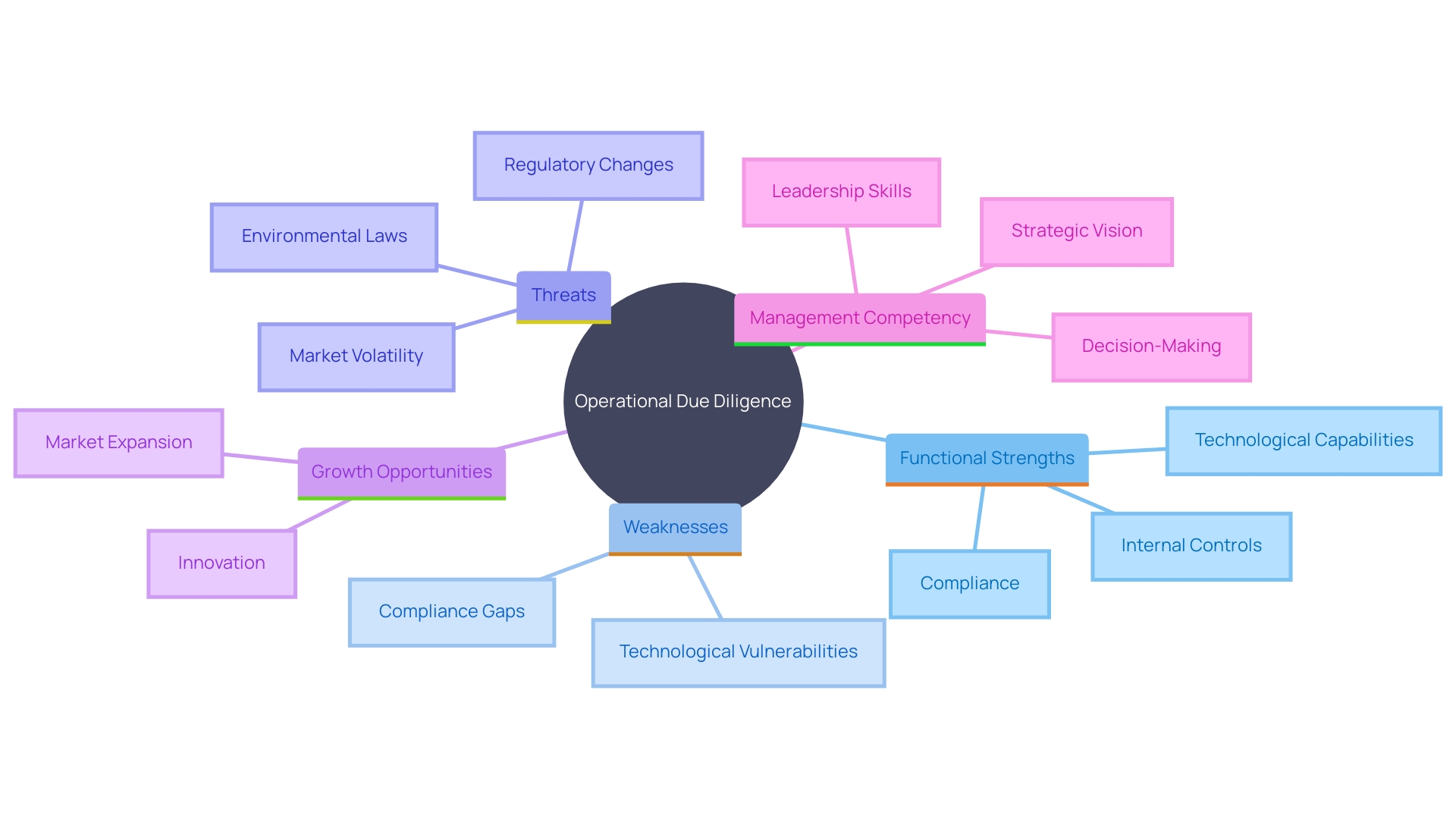
Key Areas of Focus in Operational Due Diligence
When conducting operational due diligence, it is essential to focus on several critical areas to ensure comprehensive evaluation and risk mitigation:
-
Process Efficiency: Analyze the efficiency of core business processes and workflows. For instance, in the data sourcing sector, timely and accurate data procurement can significantly impact competitive advantage. A streamlined process from data discovery to onboarding is crucial, as demonstrated by the Travel Charme Strandhotel, which enhanced operational efficiency through technological integration, subsequently improving guest satisfaction and operational fluidity.
-
Financial Controls: Assess the robustness of financial management and reporting systems. This includes evaluating financial statements, cash flows, and projections to ensure financial health. As highlighted by the recent IRS inflation adjustments affecting tax provisions, staying updated with regulatory changes is vital for maintaining accurate financial controls and compliance.
-
Compliance and Risk Management: Review adherence to regulatory requirements and the effectiveness of management frameworks for potential issues. This involves examining a company's compliance with tax laws, legal liabilities, and adherence to environmental regulations. The NFIB's report on small-business optimism highlights the significance of strong management, particularly in unstable economic situations where inflation and regulatory changes present substantial threats.
-
Technology and Infrastructure: Examine the adequacy of IT systems and support structures that facilitate operations. Effective technology infrastructure can lead to substantial time and cost savings. For instance, Forest Admin's adaptable solution allowed for a significant rise in user capacity without sacrificing security or performance, demonstrating the significance of robust and versatile IT systems in fostering growth.
By carefully assessing these domains, companies can reveal possible challenges and prospects, ensuring a more knowledgeable and strategic approach to due diligence in operations.
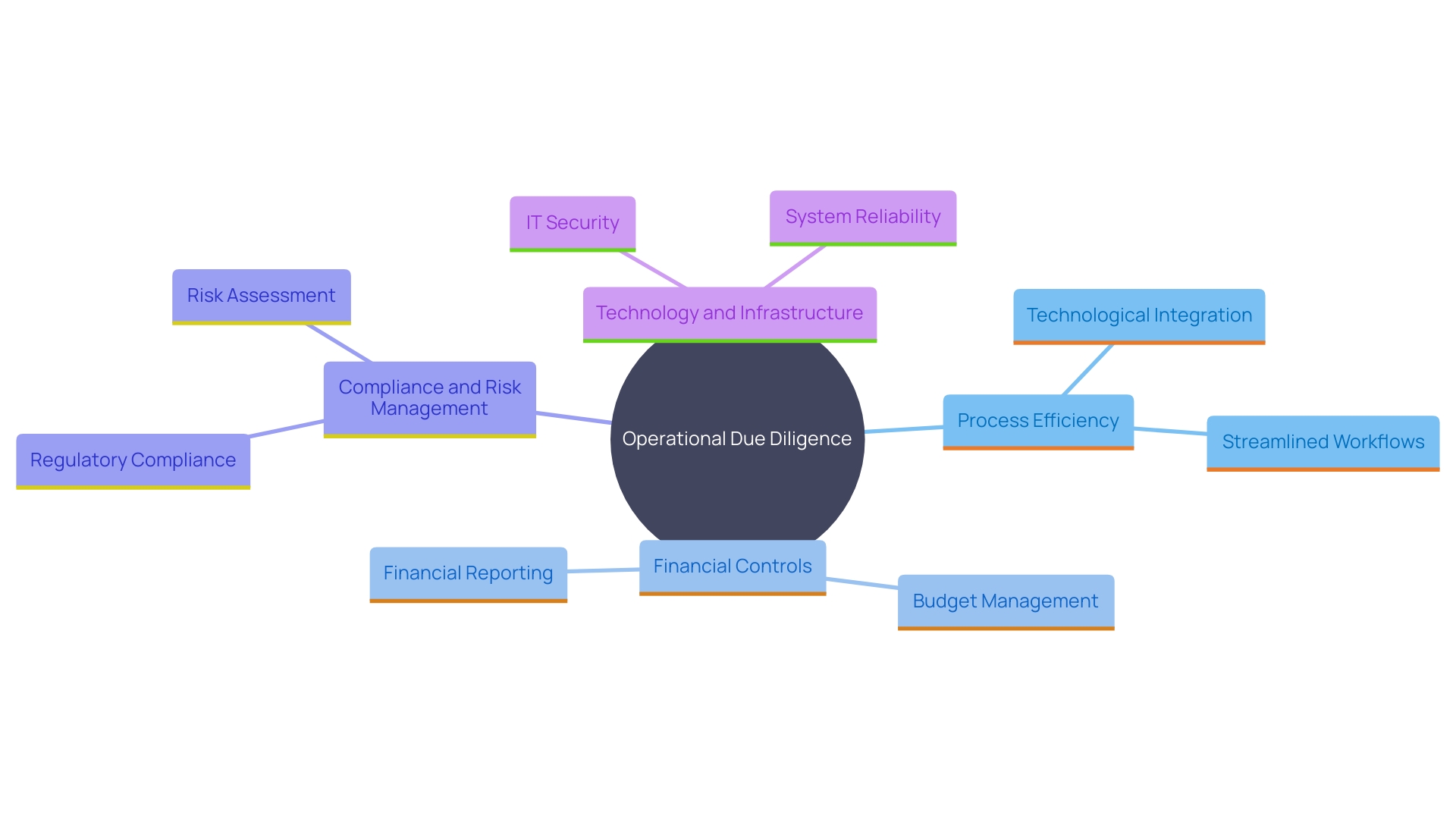
Best Practices for Conducting Operational Due Diligence
To maximize the effectiveness of operational due diligence, consider the following best practices:
-
Engage Cross-Functional Teams: Involving stakeholders from various departments ensures a comprehensive perspective. For example, a business continuity management (BCM) program should involve staff from human resources, legal, facilities, IT, security, and finance to recognize threats and develop policies addressing disruptive incidents.
-
Utilize Standardized Checklists: Develop and employ checklists to ensure thorough assessments across different functional areas. Items to consider include monitoring and dashboards, runbooks, compliance with regulations, and incident management processes. Ensuring clear documentation and procedural guidelines helps maintain consistency and lowers the chance of overlooked details.
-
Conduct Site Visits: On-site evaluations provide critical insights into functional realities and team dynamics. This hands-on approach helps identify potential issues that may not be evident through reports alone. For example, assessing the availability and functionality of monitoring systems and understanding how the team manages incidents are crucial for accurate evaluations.
-
Validate Information: Cross-verifying data and reports with third-party sources is essential to ensure accuracy. This step reduces the chance of depending on inaccurate or incomplete information. As demonstrated by the World Bank’s adaptive management during the COVID-19 pandemic, effective validation processes can significantly enhance project performance and resilience.
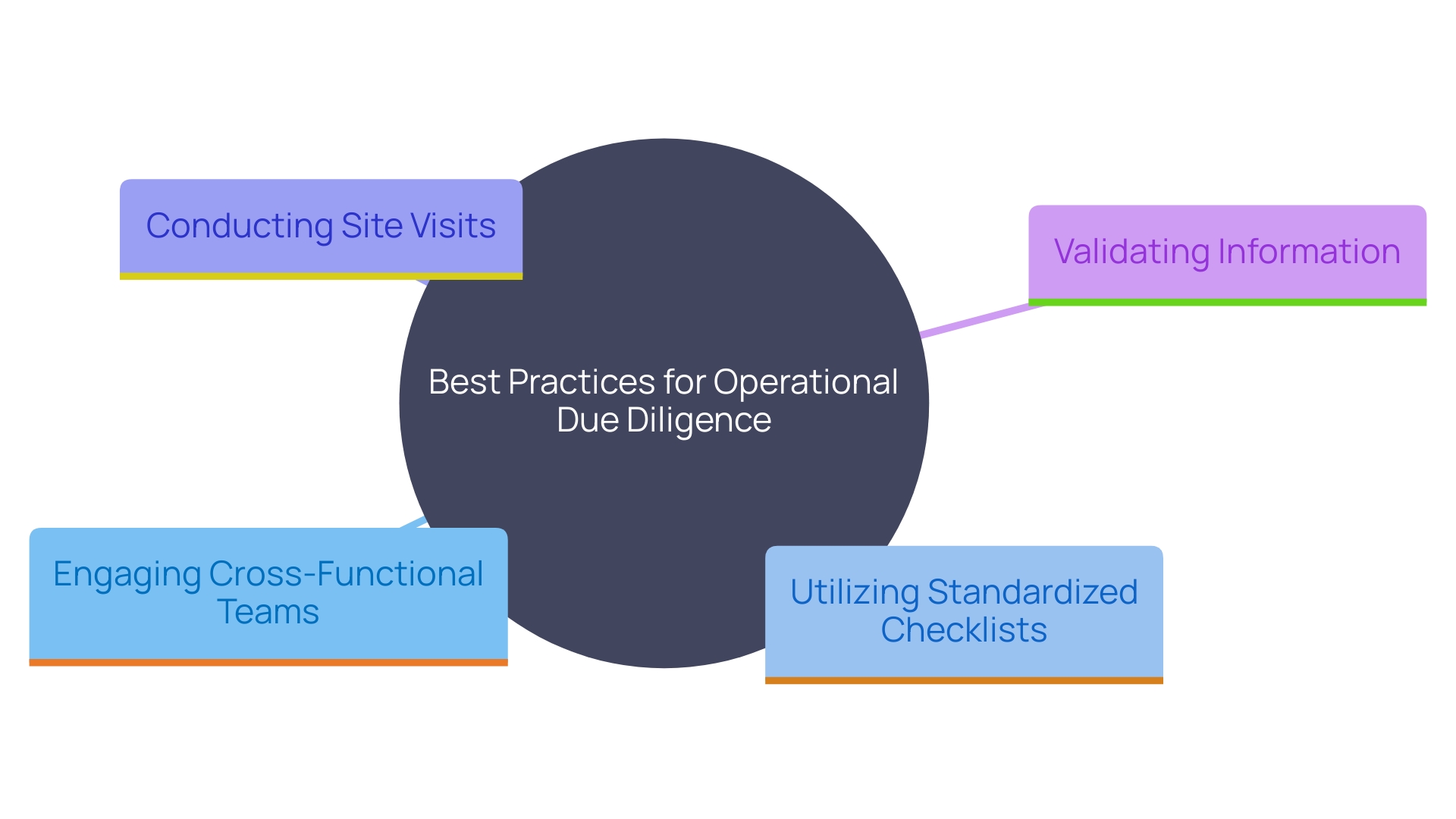
Operational Due Diligence Process and Framework
A structured framework for functional due diligence involves several critical stages to ensure a comprehensive evaluation of a company's operations.
-
Planning: Define the scope, objectives, and timelines for the assessment. This is essential to ensure that all relevant areas are covered, and the process stays on track. As stated by industry specialists, a thorough review of the target company’s business strategy, financial documents, and processes is essential to uncover possible challenges and opportunities.
-
Data Collection: Gather quantitative and qualitative data from various sources, including financial reports, employee interviews, and market analysis. For instance, PitchBook tracks financial data on over 3.5 million companies globally, providing access to comprehensive data such as cash flow statements, balance sheets, and income statements. This stage may also include evaluating the company's staff, functional challenges, and market potential to ensure strategic and financial sense.
-
Analysis: Analyze the collected data to identify strengths, weaknesses, and areas for improvement. This includes evaluating revenue, profit, and margin trends, as well as industry and competition metrics. Confirming the accuracy of financial metrics such as earnings per share (EPS), price-to-earnings (P/E) ratio, and price/earnings growth (PEG) ratio is vital for understanding the fiscal health of the company. Additionally, comparing the company’s performance against its peers in the industry provides a holistic view of its competitive position.
-
Documentation: Prepare a detailed report highlighting findings, concerns, and recommendations for action. A meaningful due diligence report should cover legal, financial, and operational aspects, providing a clear picture of the target company's current status and future potential. The report should also offer actionable recommendations to address identified risks and leverage opportunities for growth.
This structured approach not only ensures thorough due diligence but also enhances competitiveness and profitability by uncovering critical insights and guiding informed decision-making.
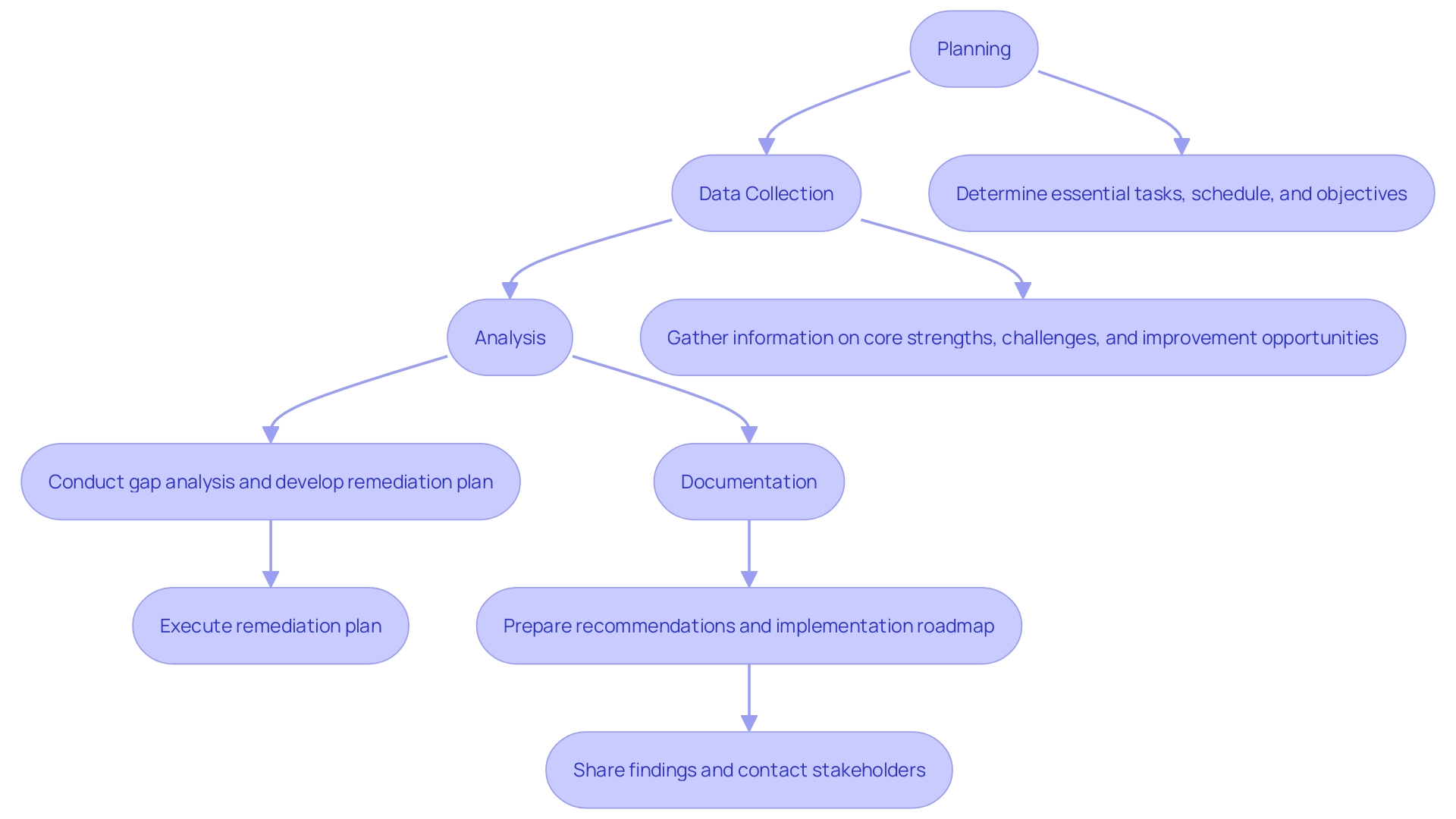
Tools and Software for Operational Due Diligence
Harnessing technology is crucial for enhancing the operational due diligence process. Utilizing the right tools can significantly streamline workflows and improve decision-making. Here are some essential tools to consider:
-
Data Analytics Software: Platforms like Tableau and Power BI enable comprehensive data visualization and analysis. These tools offer strong data analysis capabilities, assisting organizations in identifying trends, predicting future performance, and making informed decisions. According to Forrester, leveraging such technologies can offer a competitive advantage by allowing firms to respond swiftly to market demands.
-
Project Management Software: Implementing solutions like Asana and Trello can optimize task management and timelines. These platforms enhance communication and coordination within the organization, ensuring that all departments align with company goals. As indicated in the Project Management Institute's findings, effective project management is essential for reporting progress and achieving organizational objectives.
-
Risk Management Tools: Utilizing tools such as LogicManager aids in identifying and reducing threats. These solutions assist organizations in remaining compliant with constantly evolving regulations and handling potential risks efficiently. As highlighted by experts, maintaining compliance and financial health is paramount for long-term viability.
Incorporating these technologies can result in substantial enhancements in efficiency, cost reductions, and overall growth.
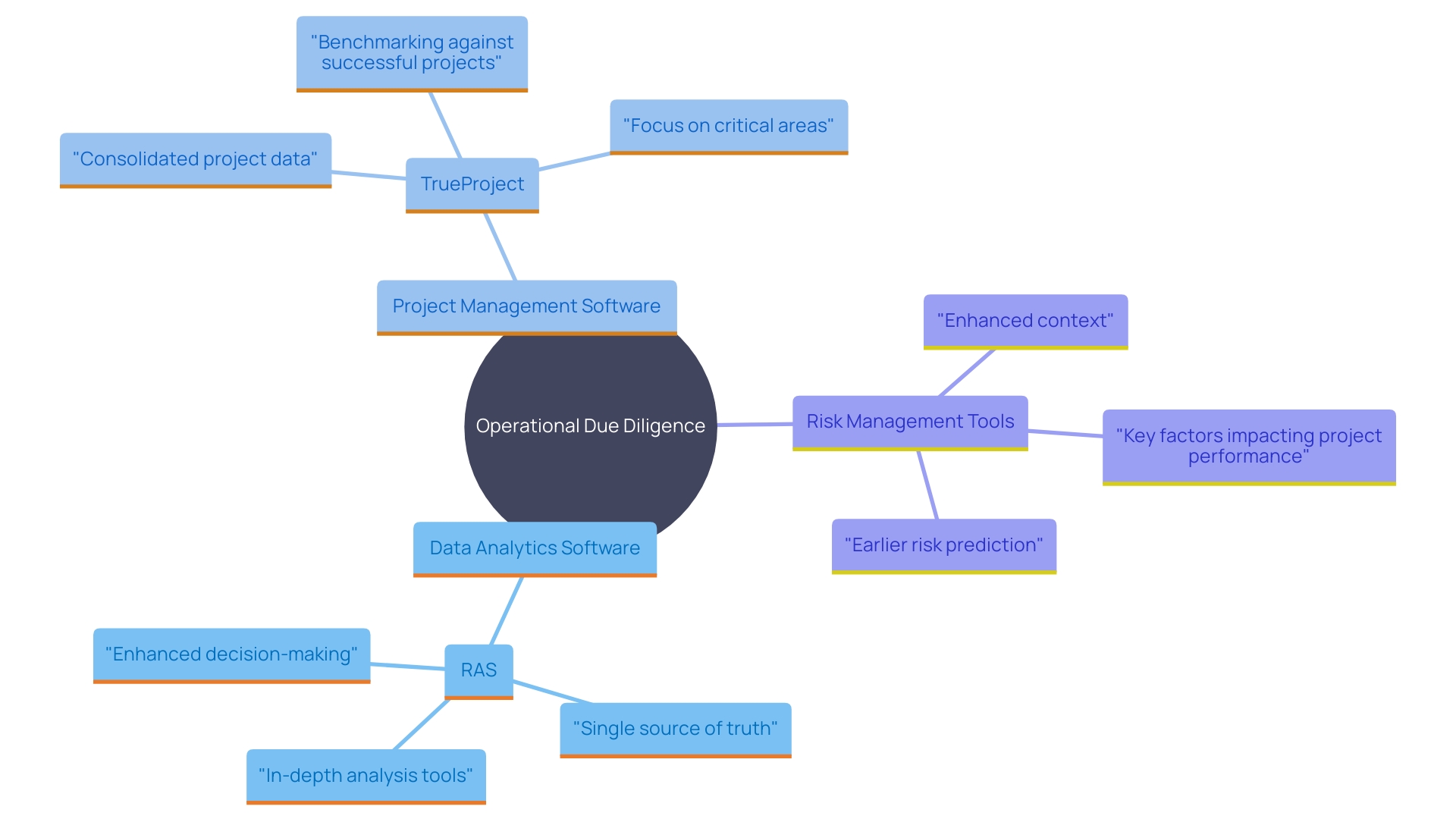
Case Studies: Implementing Operational Due Diligence
Analyzing case studies provides essential insights into the effective implementation of due diligence. A notable example involves a high-end jewelry shop that maintained exceptional cash flow and a solid customer base but faced challenges due to the unique skills and relationships of its current owner. By conducting comprehensive due diligence, the business identified dependencies that could potentially hinder future growth. Addressing these issues, they expanded their online sales and enhanced their market presence, resulting in a 25% increase in sales within six months. This case highlights the significance of comprehensive due diligence in revealing concealed inefficiencies and utilizing strategic enhancements to promote substantial growth.
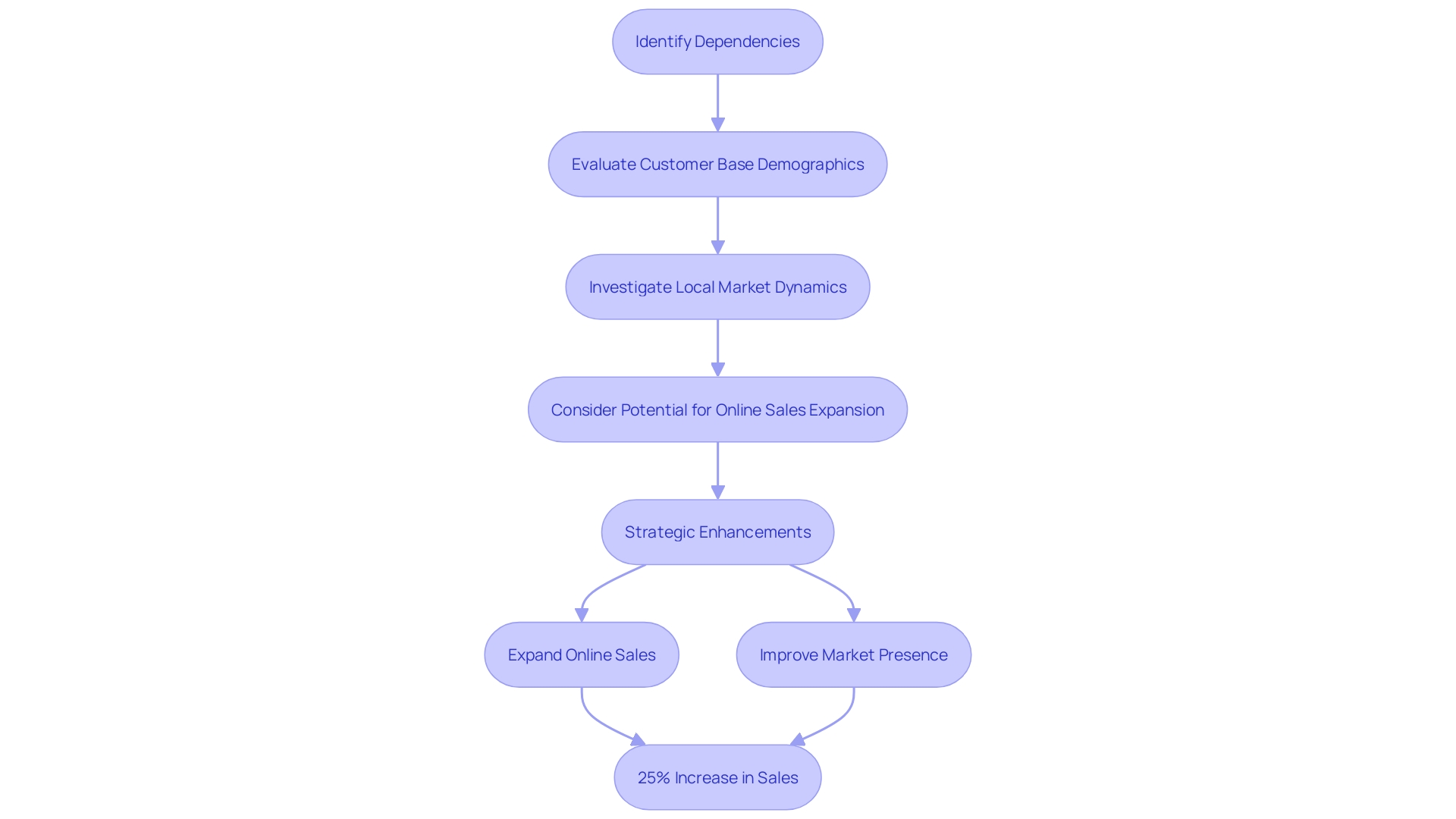
Creating an Actionable Value-Creation Plan
Creating a practical value-creation strategy after evaluation is essential to tackle identified performance gaps. This plan must outline specific initiatives, clear timelines, and designate responsible parties to ensure accountability. 'Prioritize actions based on their potential to improve efficiency and reduce risks, ensuring these initiatives are aligned with strategic objectives.'.
In the dynamic landscape of business operations, leveraging technology can significantly streamline processes. For instance, Travel Charme Strandhotel Bansin in Germany utilized data-driven strategies to enhance efficiency, catering to peak demands during vacation times. The integration of technology not only enhanced guest experiences but also optimized resource allocation within their 100-room property.
Similarly, companies like Delivery Hero have demonstrated the benefits of process transformation. By eliminating IT bottlenecks in account recovery, they reduced downtime for employees, significantly improving productivity. This approach emphasizes the significance of aligning enhancements in operations with broader strategic objectives.
Furthermore, research indicates a growing optimism among SME decision-makers, with 69% more optimistic about growth opportunities compared to six months ago. This sentiment is echoed by the increase in purchases on platforms like Alibaba.com, highlighting the shift towards digital sourcing channels to enhance product offerings.
By integrating these insights into your value-creation plan, you can ensure that your initiatives not only address immediate operational gaps but also support long-term strategic objectives, fostering sustainability and growth.
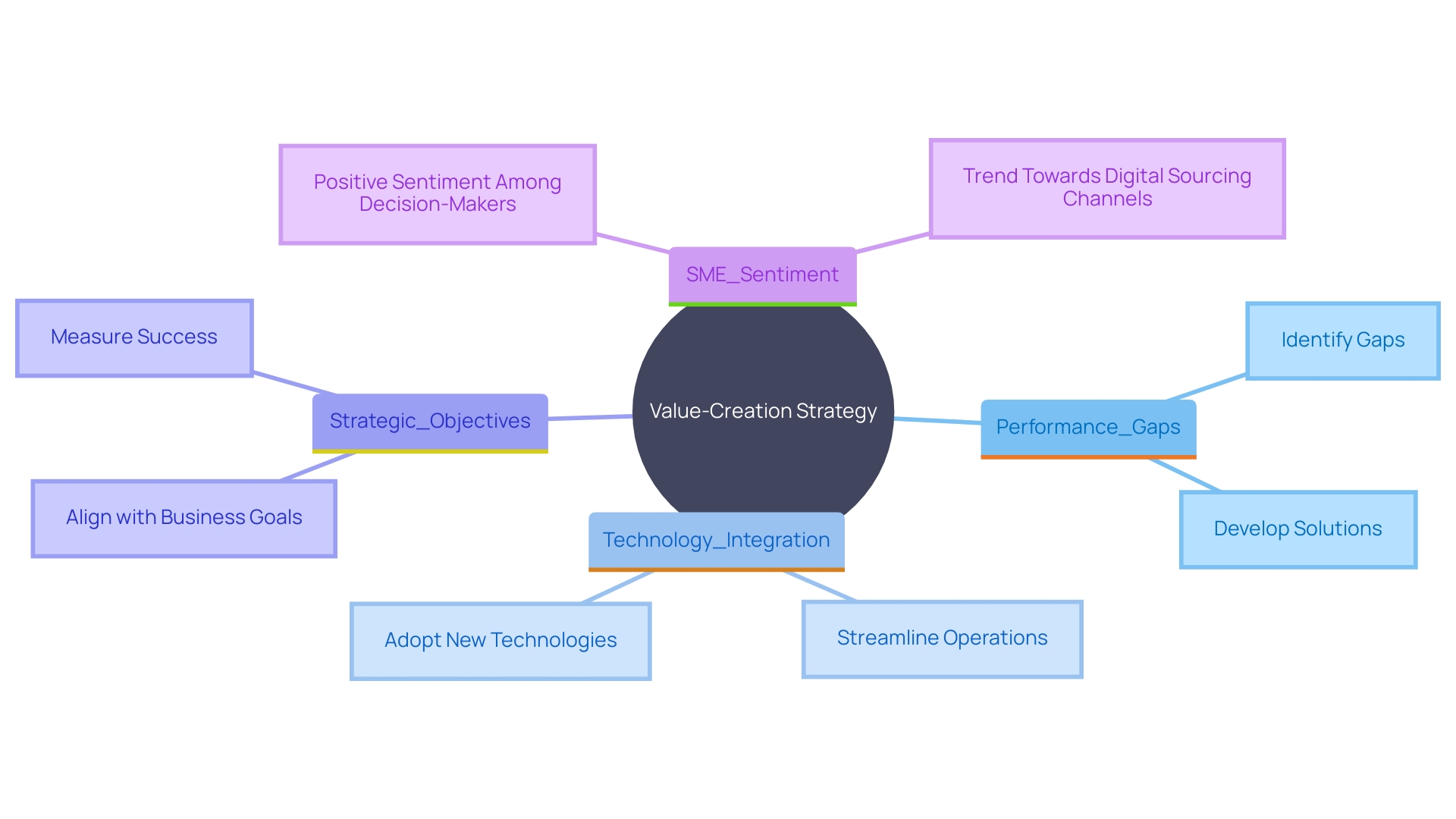
Ongoing Monitoring and Improvement
Operational due diligence should be an ongoing commitment, not a one-time task. Implement continuous monitoring and improvement mechanisms, such as regular performance reviews and feedback loops. This proactive approach, as noted by experts like Esther Duflo, helps organizations identify inefficiencies and areas for enhancement. By fostering a culture of continuous improvement, where teams are motivated to suggest and implement changes, companies can better align with compliance standards and core values. For instance, one company saw a significant increase in compliance reports after integrating adherence to standards into their annual reviews. Additionally, McKinsey's Organizational Health Index reveals that organizations with robust health practices deliver three times the total shareholder returns compared to their less healthy counterparts. This underscores the importance of integrating health and performance considerations into daily operations. Furthermore, in a post-pandemic world, traditional performance management practices have proven inadequate. A Gallup study of 18,665 U.S. employees highlights the need for re-engineered performance management systems that cater to dynamic and digital business environments. Thus, embracing continuous improvement and performance management innovations can lead to greater resilience, higher financial performance, and a more proactive operational environment.
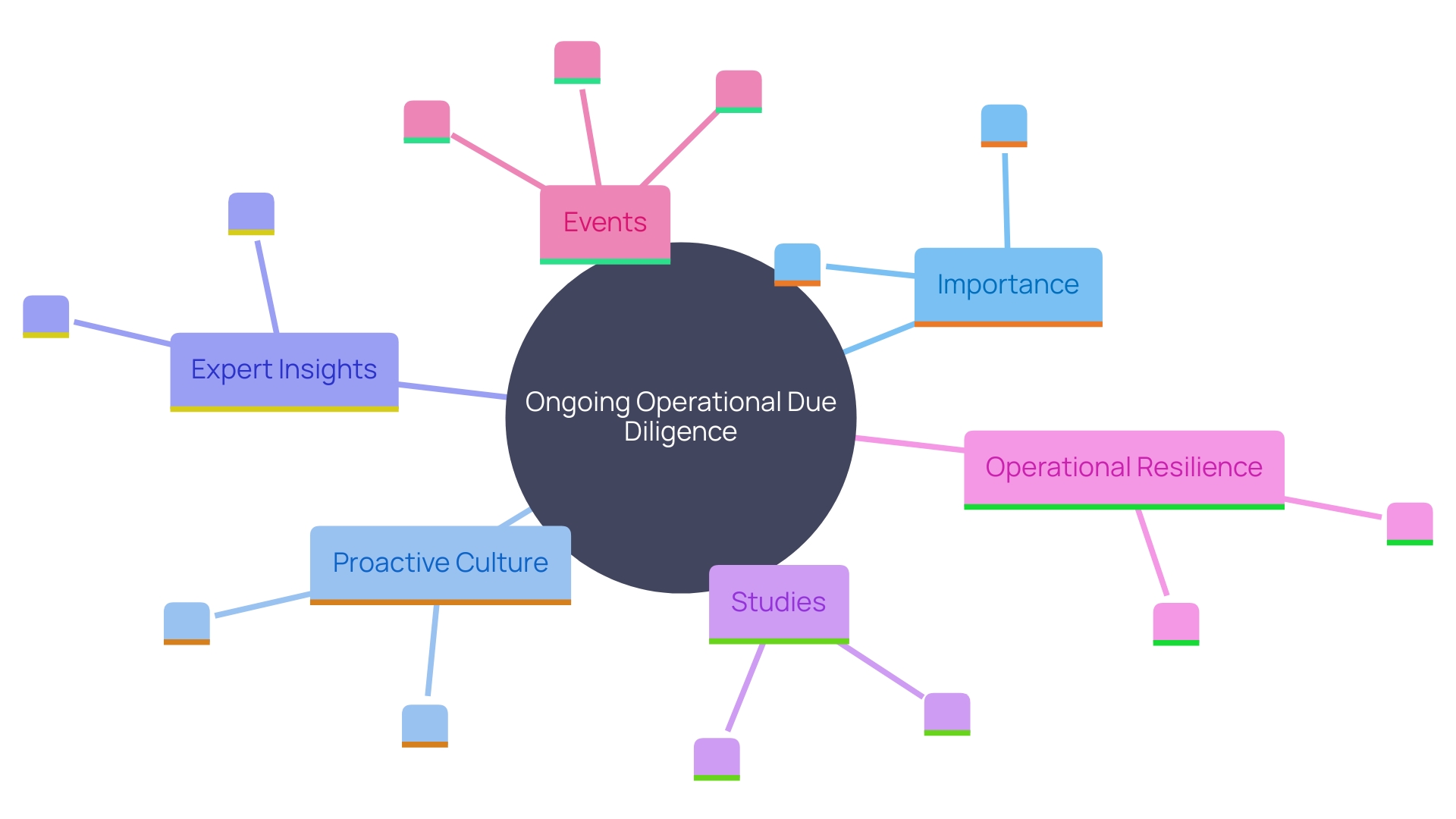
Conclusion
Operational due diligence is essential for businesses aiming to navigate the complexities of today's market landscape. By thoroughly assessing operational strengths, weaknesses, and potential risks, organizations can unlock valuable growth opportunities. Key areas of focus, such as process efficiency, financial controls, compliance, and technology infrastructure, serve as pillars for a robust evaluation.
Engaging cross-functional teams and utilizing standardized checklists further enhance the thoroughness of the assessment, ensuring that no critical detail is overlooked.
Implementing best practices and leveraging advanced tools can streamline the due diligence process, making it more efficient and effective. A structured framework that includes careful planning, data collection, analysis, and reporting ensures a comprehensive understanding of the company's operational landscape. Case studies highlight the tangible benefits of operational due diligence, showcasing how strategic improvements can lead to significant growth.
The commitment to ongoing monitoring and continuous improvement solidifies a company's operational resilience. By fostering a culture that emphasizes accountability and proactive enhancements, businesses can align their operational strategies with long-term objectives. This approach not only mitigates risks but also positions organizations for sustainable success in an ever-evolving market.
Embracing operational due diligence is not merely a best practice; it is a strategic imperative that can drive competitive advantage and bolster overall business performance.




